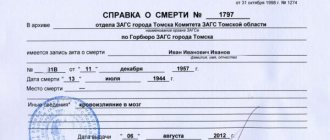Article updated: March 17, 2020 Author of the article Alexey BessonovPracticing Moscow lawyer
Hello. I am a visiting lawyer from the Bessonov and Partners law firm. I help owners discharge citizens through the court. In this article I will describe instructions for an apartment owner who wants to register a common-law husband or wife. The instructions are the same for both cases.
To discharge any person without his consent, you must have a positive court decision - clause 1 of Art. 35 LC RF and Art. 7 of the Law of June 25, 1993 N 5242-1. Therefore, there is only one way - to court.
If a common-law husband or wife refuses to check out on their own or ignores this requirement, the owners need to file a claim with the district court to terminate the rights to use the residential premises.
All owners must agree to the discharge of the husband/wife and report this at the trial. If one of the owners declares his disagreement, then the judge will most likely refuse the claim.
Grounds for an extract - we build a chain of articles of law
- There is no such thing in law as a common-law husband, common-law wife, cohabitant or cohabitant. Only a registered marriage gives rise to marital and family relations - clause 2 of Art. 1 and Art. 10 IC RF. A common-law husband/wife does not have the status of a family member or relative; they are considered strangers.↓
- When the owner of an apartment registers a common-law husband/wife with him, it is considered that they have entered into an agreement between themselves for the free use of the apartment orally - clause 2 of Art. 30 LC RF and clause 1 art. 689 of the Civil Code of the Russian Federation. That is, the owner allowed the common-law husband/wife to live and use the apartment for an indefinite period.↓
- The owner has the right to unilaterally terminate oral agreements with strangers to live in his apartment - clause 1 of Art. 699 Civil Code of the Russian Federation.↓
- Registration of a common-law husband/wife violates the owner’s rights to freely dispose of the apartment, therefore he has the right to demand that this violation be eliminated - Art. 304 Civil Code of the Russian Federation.↓
- In addition: even if the apartment was purchased in a civil marriage (although there is no such thing), it is not jointly acquired property. Only registered spouses have a regime of joint ownership - Art. 256 Civil Code of the Russian Federation, Art. 33 and art. 34 RF IC.
It makes no difference whether the common-law husband/wife paid for utilities. The main thing is to inform that the oral accommodation agreements have been terminated.
Legal ways to expel your ex-wife from the apartment
If real estate is acquired or privatized after the wedding, it will not be possible to discharge the husband, much less evict him.
When the need for eviction arises, it is not recommended to immediately go to court. You can send a complaint to the local government authority (since it was the one who rented you the apartment for social rent) with a request to issue a warning to your cohabitant.
If the defendant does not attend the first hearing, another one will be scheduled. The second meeting will usually take place 10-30 days after the first. By law, the defendant must be notified twice.
There must be more compelling reasons for this - such as creating dangerous situations for other residents, systematic non-payment of rent. Or, for example, a cohabitant sets up a sewing workshop or a hairdresser in one of the premises.
The text of the application must indicate:
- name of the court;
- Full name and contact information of the plaintiff and defendant;
- essence of the question;
- references to available evidence and legal norms;
- a request for the forced discharge of the ex-wife with her subsequent eviction;
- a list of all documents attached to the application;
- date, signature of the applicant.
The instructions are approximately the same for deregistration of family members such as parents and adult brothers and sisters.
What if a common-law husband or wife lives in an apartment?
It makes no difference whether he lives or not. This fact does not affect the court's decision in any way. In most cases, the court does NOT leave registration to strangers for a certain period of time.
There are, of course, minor differences only in the judicial procedure. The main thing here is to competently draw up a statement of claim and prepare for court. Read about this below in my detailed instructions.
Our law office "Bessonov and Partners" offers residents of Moscow or the region. We will take on all the possible work - we will draw up a correct statement of claim, collect all the necessary documents and submit them to the court. You will not need to come to court hearings; the office's lawyer will participate in them and will do everything possible to win the case. At the end of the trial, we will bring you a copy of the court decision.
We have been working in the field of court records since 2008 and have won 84% of court cases.
The cost of the service is 50 - 60 thousand rubles. For visitors to this site there is a discount of 5% to 10%. To receive it, say that you came from the website “Prozhim.com”. For all questions and for a free consultation, call the number (daily from 9:00 to 21:00 Moscow time / only for residents of Moscow and the region).
How to discharge your ex-spouse from a municipal apartment?
After a divorce, many people wonder how to evict and discharge their ex-spouse from a municipal apartment. It would seem that the question is completely simple, but from a legal point of view, not everything is so simple and easy and in order to do everything legally, you need to follow certain rules. Which ones exactly? Read further in the article!
The situation usually develops as follows. You are a tenant of a municipal apartment, your marriage has been dissolved and your ex-spouse has moved out of the apartment, but he does not want to be deregistered voluntarily.
How can you expel your ex-wife (or spouse) from a privatized apartment?
What should I do if my ex-spouse refuses to voluntarily deregister?
You need to file a lawsuit to recognize your ex-spouse as having lost the right to use the residential premises, or to terminate the ex-spouse's right to use the specified residential premises and to remove him from the registration register.
In accordance with the Housing Code of the Russian Federation, if the tenant and his family members leave the residential premises, the social rental agreement is considered terminated from the moment the tenant and his family members leave.
Also, according to established judicial practice, it is necessary to prove that the former family member left not temporarily, but permanently, that is, he voluntarily changed his permanent place of residence.
At the same time, if you do not allow him into the apartment and create obstacles in his use of the living space and he can prove this in court, then the court will deny your claim.
What do you need to refer to in order to win a dispute in court and discharge your ex-spouse?
As already mentioned, you need to prove that your ex-spouse voluntarily changed his permanent residence. This may be indicated by:
- Conclusion of a new marriage;
- Moving to a new spouse at his place of residence;
- Change of medical institution in which he was constantly observed;
- Left for permanent residence in another state;
- Any other evidence that may indicate that the person has changed his permanent place of residence.
The above data will also need to be proven; it is necessary to confirm that the person has changed his permanent place of residence, and not forcibly and temporarily left your apartment.
It should also be noted that there is no specific period during which a person must be absent in order for the court to recognize that the person has really changed his place of residence, simply to simply not. The court decides in each specific case whether you have proven or not proven that your ex-spouse has really changed his place of residence. Accordingly, the amount of evidence you provide to the court must be sufficient. You need to prove:
1.Your ex-husband left the apartment voluntarily, that is, you did not kick him out, but he voluntarily left his permanent place of residence;
2.He left his place of residence not temporarily, but permanently;
3.At the moment, he does not pretend to live in this residential premises and you do not in any way interfere with his residence;
If you have this evidence, you have every chance of a successful outcome of the case. As you can see, everything is simple and the most important thing here is clear and real evidence, without it you can’t go anywhere.
I hope I have fully covered this topic. And if you have questions, ask them on our website.
Know your rights. Wish you luck!
Did you like the article? Share it on social networks, click on one of the icons:
About the author:
Moskvitin Alexander . Practicing lawyer at the Legal Aid Center 'Leader'. The main specialization is civil disputes, mainly land law, real estate disputes. Author of more than 100 articles on the portal. Total legal experience over 15 years. Ready to win even the most difficult cases. In 2001, he graduated from the Financial University under the Government of the Russian Federation.
About your residential address
When being discharged, the following questions are often asked: “The common-law husband/wife has moved out of the apartment and I don’t know where he/she lives. What address should I indicate in the documents? Or is it necessary to indicate the actual address?”
According to judicial practice, the defendant’s place of residence is considered to be his registered address - clause 63 of the Resolution of the Plenum of the Supreme Court of June 23, 2020 N25. Therefore, in the statement of claim and other documents, we indicate the address of residence of the common-law husband/wife with the address of his/her registration, that is, the apartment from which we will demand to be discharged. The plaintiff is not required to know where the defendant actually lives.
All subpoenas to the common-law husband/wife will be sent to the address of the apartment according to registration, where he/she may not live - Art. 113 Code of Civil Procedure of the Russian Federation. If the defendant does not receive a summons (because he does not live there), the court will still consider him to have been served with notice. Receiving any correspondence is a citizen's responsibility. Therefore, everything is according to the law. If the defendant does not appear in court, the case will be considered without his participation - clause 4 of Art. 167 Code of Civil Procedure of the Russian Federation.
Conditions and features
It is important to begin with to understand that deregistration from living space is carried out with the help of registration authorities in cases where:
- There has been a change in place of residence. This procedure is carried out upon presentation of a request for a desire to be deregistered at a given place of residence. If a person registered in a new apartment and was unable to submit this application, then within three days the registration authority sends a message about the discharge from the previous living space.
- A citizen has been called up for military service - it is registered at the request of the military commissariat.
- A person is arrested - formalized through a legal court decision.
- Missing person - formalized through a court order.
- Upon recognition as deceased - through a legal death certificate.
- There is an eviction from the living space or the loss of rights to use it is determined through a court decision.
- Inconsistencies in documents, forgeries that served as the basis for registration, or illegal actions of officials are discovered - by a court decision.
Does your cohabitant flatly refuse to leave the apartment in which you are the owner?
It is necessary to go to court with a claim to recognize her as having lost the right to use your privatized apartment and to demand that she be discharged. After filing a claim, it is necessary to substantiate your claims, indicating that in fact, family relations no longer exist, even taking into account joint residence in the territory of one apartment, that there is no family household, and living in the future is impossible.
How to expel an ex-husband or wife from an apartment?
Out of habit, we still say – register, check out. From the point of view of representatives of the law, we should talk about registration. But with the change of term, the essence of many problems remained the same.
For example, when the question of the legality of residence and the possibility of eviction is raised. Theoretically, every citizen should be aware of what he should and what he must.
Including in housing and communal services. If the right to use housing has ceased, registration must also cease.
Conscious people do this. Termination of marriage is one of the grounds for such a procedure if the former spouse does not carry out all registration actions voluntarily. You can’t do without subtleties here either.
Let's consider why it is possible (not) to expel certain categories of citizens (ex-wife, husband) from the apartment without their consent.
Ex-wife doesn't want to leave the apartment
Advice from lawyers:
1. I live in the same apartment with my future husband (he is the owner), his ex-wife does not want to leave the apartment (purchased before marriage). Their child together is also registered in the apartment. Can she claim part of the apartment? How can I get her to leave? And if it doesn’t work out, can he oblige her to pay half of the utilities?
1.1. Non-resident persons can be deregistered through a judicial procedure.
Did the answer help you?YesNo
1.2. Can not. It’s easy to evict her and discharge her in court. And then collect from her the paid property in her share.
Did the answer help you?YesNo
1.3. A claim in court for loss of use of a residential premises, the right to use.
Did the answer help you?YesNo
1.4. Greetings. Can claim part of the property in the event of a significant improvement in living conditions. The child will be the heir of the first priority and will claim the father's property. It is possible to resolve the issue of her eviction in court. Good luck.
Did the answer help you?YesNo
Consultation on your issue
8
Calls from landlines and mobiles are free throughout Russia
2. The ex-wife does not want to check out of the apartment and claims it in the future, for which I am paying a mortgage. The mortgage was taken out in 2008 during marriage. Can I ask her to pay half of the debt from 2008 or just the last 3 years?
2.1. The apartment was purchased during marriage and is joint property; the wife has every right to claim half. Loan debts are also divided equally.
Did the answer help you?YesNo
2.2. Hello, Maria, you can recover half of the mortgage payments from the moment the joint household ends (in fact, from the moment the marriage is dissolved). The general limitation period is three years (Article 196 of the Civil Code of the Russian Federation)
Did the answer help you?YesNo
2.3. The ex-wife does not want to leave the apartment and claims it in the future, for which I pay the mortgage. The mortgage was taken out in 2008 during marriage. Can I ask her to pay half of the debt from 2008 or just the last 3 years? You have the right to demand compensation for half of the payment from the time when your relationship ended and you stopped running a joint household.
Did the answer help you?YesNo
3. The ex-wife does not want to leave the apartment and her place of residence is unknown; we have not lived together for 4 years. How to write it out.
3.1. Contact the court at your place of residence with a statement of claim for recognition of the loss of the right of residence and deregistration.
Did the answer help you?YesNo
3.2. Hello Andrei! Who is the owner of the apartment? If the former spouse is not the owner, then upon termination of family relations with the owner, the right to use the residential premises does not remain with the former family member. In this case, you can go to court with a claim to terminate the right to use the residential premises. Then, based on the court decision, contact the registration authority with an application for eviction.
Did the answer help you?YesNo
4. Before marriage, I bought an apartment with a mortgage, then got married, lived in marriage for a year and divorced, and a child was born in the marriage. Question: The ex-wife does not want to leave the apartment. If I pay off my mortgage loan early (about 800,000 rubles), won’t my ex-wife, who is currently registered in the apartment, be able to claim a share? Officially divorced on January 20, 2020. For the mortgage, absolutely all checks are in my name.
4.1. Hello! The wife has nothing to do with the apartment.
Did the answer help you?YesNo
4.2. Hello, Ruslan. The maximum that an ex-wife can claim is compensation actually paid during the marriage for a mortgage loan. Calculate how much money was paid to pay off the loan during the marriage and divide by two... this will be the amount of compensation. She cannot claim the apartment itself. Considering that the marriage was dissolved in January 2020, you can safely pay off your mortgage early. And when you register ownership of the apartment without bank restrictions (mortgage), you will be able to write your ex-wife out of the apartment through the court, as a former family member.
Did the answer help you?YesNo
5. Before marriage, I bought an apartment with a mortgage, then got married, lived in marriage for a year and divorced, and a child was born in the marriage. Question: The ex-wife does not want to leave the apartment. If I pay off my mortgage loan early (about 800,000 rubles), won’t my ex-wife, who is currently registered in the apartment, be able to claim a share? Or is it better to first discharge her through the court? Officially divorced on January 20, 2020. For the mortgage, absolutely all checks are in my name.
5.1. Hello, she needs to be discharged through the court.
Did the answer help you?YesNo
5.2. Hello, Ruslan. The maximum that an ex-wife can claim is compensation actually paid during the marriage for a mortgage loan. Calculate how much money was paid to pay off the loan during the marriage and divide by two... this will be the amount of compensation. She cannot claim the apartment itself. Considering that the marriage was dissolved in January 2020, you can safely pay off your mortgage early. And when you register ownership of the apartment without bank restrictions (mortgage), you will be able to write your ex-wife out of the apartment through the court, as a former family member.
Did the answer help you?YesNo
6. The marriage was dissolved in March 2020. The apartment was given to me by my older brother during the marriage (under a gift agreement). There was no dispute over property. The ex-wife does not want to leave the apartment, and sets conditions for the voluntary donation of part of the apartment in her favor. Question: will I be able to discharge her in court if she does not appear at court hearings (as she stated)?
6.1. File a claim with the court for deregistration.
Did the answer help you?YesNo
6.2. Good afternoon You can. After the decision comes into force, go to the passport office and deregister. I can help you draw up a claim and protect your interests in court. Inexpensive and fast!
Did the answer help you?YesNo
7. Before marriage, I purchased an apartment with a mortgage, we lived in marriage for a year and divorced two months ago, and a child was born in the marriage. Question: The ex-wife does not want to leave the apartment. If I repay the loan ahead of schedule (about 800,000 rubles), won’t my ex-wife, who is currently registered in the apartment, be able to claim a share? Officially divorced on January 20, 2020.
7.1. Good afternoon Don’t repay it and have it discharged through the court. File a statement of claim with the court to declare the right to use the residential premises lost and deregistered. In accordance with Art. 30 of the Housing Code of the Russian Federation, the owner of a residential premises exercises the rights of ownership, use and disposal of the residential premises belonging to him by right of ownership. According to Part 4 of Art. 31 of the Housing Code of the Russian Federation, in the event of termination of family relations with the owner of a residential premises, the right to use this residential premises for a former family member of the owner of this residential premises is not retained, unless otherwise established by agreement between the owner and the former member of his family In accordance with clause 31 of the Rules for registration and withdrawal citizens of the Russian Federation from registration, removal of a citizen from registration at the place of residence is carried out by the registration authorities if the citizen is recognized as having lost the right to use residential premises - on the basis of a court decision that has entered into legal force.
Did the answer help you?YesNo
8. We lived in a civil marriage and have two children aged 12. The owner of the apartment is my mother. My ex-wife doesn’t want to leave the apartment; they are renting an apartment. She owns her own house. Can the mother sign them out of the apartment? Thank you very much.
8.1. Hello, Vladimir! Your mother can file a claim with the district court to terminate the right to use the apartment and deregister your ex-wife. The owner of a residential premises exercises the rights of ownership, use and disposal of the residential premises belonging to him by right of ownership in accordance with its purpose and the limits of its use. The owner of a residential premises may demand the elimination of any violations of his rights, even if these violations were not associated with deprivation of possession.
Did the answer help you?YesNo
We are discharging our ex-wife from a municipal apartment without her consent
↓ Does not pay utility bills (or pays them partially), does not participate in the repair and maintenance of the apartment.
This is in Part 4 of Art. 69 Housing Code of the Russian Federation.
↓ She did not try to enter again, and if she did, she was NOT prevented from doing so. The extract instructions themselves are written below. If all conditions for discharge are met, then this is good.
But the difficulty is this: the existence of conditions must be PROVED IN WRITTEN.
How to evict a non-owner from an apartment? Is it possible to be evicted from an apartment without consent?
This aspect is only valid if the tenant does not pay taxes, does not live in and has another home that the court can recognize as permanent and habitable.
We recommend reading: Guarantee for forged products to protect consumer rights
Registration in occurred after the fact of its privatization by the last owner. The owner of the apartment has the right to easily write out the non-owner.
However, this possibility does not apply to minors, since their discharge is prohibited by law.
How can I expel my husband from the apartment without his consent if I am the owner?
In this section you will get an answer to the burning question: how to expel your husband from the apartment if he is not the owner?
Or how to expel your wife from the apartment without her consent? As already mentioned - by judicial procedure.
To do this, you will have to contact the district court of general jurisdiction at the place of residence of the responding party.
The statement of claim is submitted in the number of copies based on the number of participants in the analysis.
The claim must contain:
- applicant details;
- date, place of writing;
- full name of the court site;
- defendant's details;
- the basis on which the applicant owns the apartment (social tenancy agreement, purchase and sale, etc.);
- Why are you asking to discharge a person from his home?
- reasons for exclusion, links to articles;
- attempts to resolve the issue pre-trial;
- demand what you want from the court;
- list of attached papers;
- signatures.
.
.
One statement will not be enough. In addition to it, the following documents will be required :
- general civil identity cards;
- certificates from the EIRTs, a district police officer’s report, other papers confirming the validity of the requirements;
- photo and video materials;
- social rental agreement;
- extract from the house register;
- a copy of the financial and personal account;
- documents confirming the ownership of the home.
It’s better to immediately prepare yourself for the fact that it won’t work out at once. Moreover, if you act alone, without a lawyer (which is strictly not recommended).
Especially if we are talking about municipal housing, because Article 40 of the Constitution of the Russian Federation is touched upon, emphasizing the inalienability of the right to housing.
And the judge, having not received convincing evidence that the person has somewhere to go, will either refuse it altogether or give the expelled person a month to solve their housing problems.









